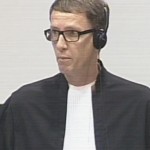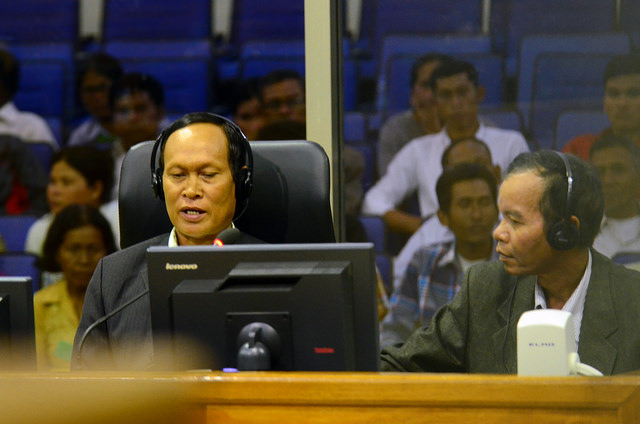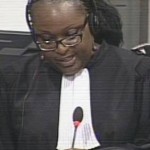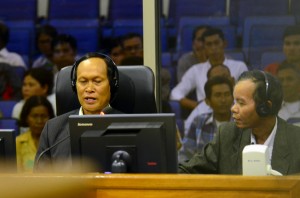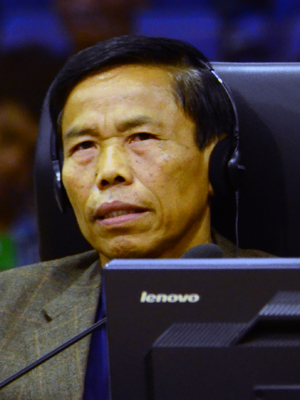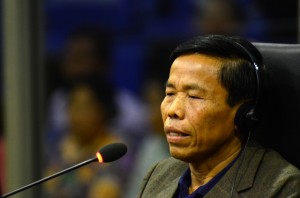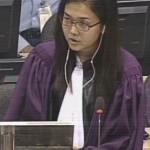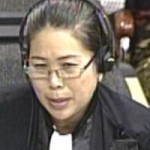“Were You Happy To Construct Trapeang Thma Dam?” – Civil Party Lawyer to Witness
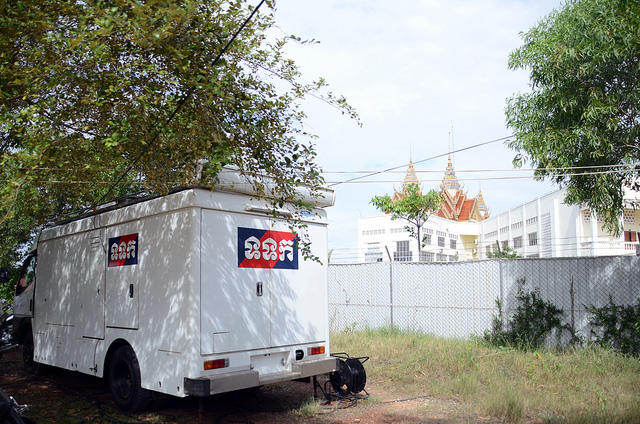
Photo of the TVK (Public Cambodian television) satellite car standing outside the Court — (ECCC Flickr) Thanks to Fatily Sa from DC-CAM for pointing out the previous caption was mistaken.
Today, on July 28, the Trial Chamber continued the second day of hearings on the Trapeang Thma Dam worksite. (For some context on the charges alleged against the defendants at this worksite, read the introduction to yesterday’s post here).
The Chamber was scheduled to finish the examination of Civil Party Mr. Sophon that had started the day before, and continue with the first witness on this segment. Before that got on their way, Mr. Koppe re-hashed a part of yesterday’s document debate but now on DC-Cam statements related to the Trapeang Thma Dam. Both the civil party lawyer and the prosecution did not understand what the problem was but answered Koppe and Judge Lavergne’s questions.
One of Koppe’s questions is whether the prosecution is aware of when the 66 DC-Cam statements related to the Trapeang Thma dam will be available in English as only some of them are and when they will be translated into French as none of them are.
Before the prosecution could respond, Judge Lavergne interrupted to ask if the documents Koppe was referring to had already been admitted into the case file. Koppe responded that it looked like it because they already have E3 numbers.
Joseph Boyle, assistant prosecutor, took the floor and clarified that they were entered into Zylab in April 2015, not June as Koppe had claimed. Secondly he mentioned that DC-Cam documents are public documents and are not exclusive to any party. Thirdly, Boyle stated that he had no objection to Koppe using the documents. Ms. Marie Guiraud, International Civil Party Lead Co-Lawyer, said she did not understand what the problem was and had no objection either.
–
The floor was then given to the defense team for Nuon Chea, in the firm hand of Mr. Victor Koppe, his international lawyer.
Father killed because he was a Lon Nol soldier?
Koppe started by asking Mr. Sophon about his father. Mr. Sophon confirmed that his father had been a lieutenant in the Lon Nol Army. Mr. Sophon did not know when exactly his father had been killed but he said that it was likely it was in late 1977 or early 1978 because at some point the village where his father was living flooded and he was evacuated. It was only after that or during the flood, it was not clear, when his father disappeared. Mr. Sophon said that this is what the old lady Traup (phonetical) who had received him told him. He also said that she told him that his father was taken away because of his military background.
“He actually tried to conceal his background,” Mr. Sophon said, “he told everyone including myself not to say anything, and I don’t know how they find out.”
Trapeang Thma Dam.
Mr. Sophon said that his mobile unit was taken to the dam to reinforce other units to complete the worksite during that two month period. He wasn’t told why two months and didn’t know if two months at the work site was common for other mobile units.
He also confirmed to Koppe that he did not have a watch but that he used to sun to estimate what time it was. He said that he started working as soon as there was light to see the other workers and that usually was at around 5 to 5:30 a.m.
Loudspeakers
Mr. Sophon that loudspeakers were not used to make announcements but only to play revolutionary music. To announce the start of the work day, Mr. Sophon said “they went around and forced us to go to work like cattle.” He would then explain that by “they” he refers to the unit chiefs, “they chased us to go to work, he said. Mr. Sophon cannot remember the name of his chief as he was from another cooperative.
Quota
To Koppe, Mr. Sophon explained that he never met the 3 cubic meter quota that he was set for each day. “From the start I could not meet the quota,” he said, “I had to work hard until 10 p.m. until I was allowed to rest.” He said the reason he did not meet the quota was that he was weak, did not have energy to work, and his knee-caps were bigger than his body (or looked like skulls, in another translation).
Koppe then confronted him with what he had said yesterday about people who did not meet the quota. Mr. Sophon had said that these people would be deprived of food or whipped. “ Were you whipped or deprived of food for each of the 60 days you were there?” Koppe asked.
Mr. Sophon said no. He then retracted his testimony saying that he never saw those people being whipped but he did stand firm by his testimony that people who did not wake up would be whipped. He does not recall the name of the “big unit chief” as he called him, that held the whip.
Ta Val
Mr. Sophon said that from his observations “Ta Val did not use the whip but perhaps he gave the instructions.” He continued to say, in an apparent contradiction, that “I heard the name but I never saw him., but he came to my worksite a couple of times.”
Koppe reads from the DC-CAM statement he was talking about this morning were it says that “Ta Val and Ta Moang were ruthless and unkind men… I heard that they called him [Ta Val] the golden-fanged man.“
Mr. Sophon says that he head people say that Ta Val was aggressive but that he never saw him well because he was walking far away from him at the crest of the dam with three other persons. He has never heard of the phrase “golden-fanged man.”
New People vs. Base People
Mr. Koppe attempted to understand how the distribution of food between “New People” and “Base People” was managed, if, as Koppe claimed Mr. Sophon had said, they were only told apart by their accents. Koppe attempted to repeatedly ask if everyone had to speak before they were given food. Mr. Sophon did not understand the question.
Mr. Koppe then added on the allegation that a lot of the “New People” were people who had actually been born in those places and had then moved to the cities only to be evacuated as “New People” back to the places were they grew up, and so they could presumably still have their local accent intact. “So how could the cadres tell who was a “New Person” and who was a “Base Person”?
Mr. Sophon simply responded that “Base People” were in charge of “New people” so they “knew exactly who were ‘Base’ and who were ‘New’ people.”
Late King Sihanouk responsible for the KR?
Mr. Koppe then proceed to ask Mr. Sophon why he had named King Norodom Sihanouk as one of the people responsible for the harm he had suffered.
Mr. Sophon said that “In fact it was him that introduced the Communist Party into Cambodia.” When asked to elaborate he said that his father had told him that “it was the King who introduced communism into Cambodia to get rid of the Lon Nol army.”
Then, in a bizarre twist, Koppe read out the part where Mr. Sophon had stated what kind of reparations he was asking the Court to give him. (Under Rule 23 quinquies of the Internal Rules of the ECCC, Civil Parties can only seek collective and moral reparations. No individual monetary compensation can be awarded.) Mr. Sophon had written that he wanted $1,000 dollars. Mr. Koppe then asked “if he wanted the $1,000 from the heirs of the King?” to the strenuous objection of the other side.
Mr. Koppe had the gall to retort “I should be allowed to ask to know if it is my client who has to pay the $1,000 or if it is the King?”
Marie Guiraud rose and told Koppe to be serious. He reminded him that civil parties are not allowed to ask for monetary reparation and stated that, regardless, Koppe’s client, Nuon Chea, is indigent and would not be able to pay. “Counsel is putting on a show,” she said. The Chamber sustained the objection and Koppe sat down.
__
Ms. Anta Guisse, Co-Lawyer for Khieu Samphan, then took the floor.
Mr. Sophon did not know or could not recall when the work ended or began. He also did not know or could not remember attending the inauguration.
He did confirm that form where he was working he could see the bridge that Guisse was referring to.
Mr. Sophon also admitted that he only knew what concerned his 70-person group and no more. Additionally he said that there was a bell in each unit that was rang each morning to wake them up and he does not know if it was rang at the same time in other units.
He told Guisse that his unit chief Ra would directly supervise them and he was always close by. The Unit chief, on the other hand, would go around and observe them from time to time.
Finally he told Guisse that it was a stick from a tree that was used to measure the earth to see if they had met the quota. “If it reached one meter then it was said we met the quota,” Mr. Sophon explained.
Mr. KONG Sam Onn, Co-Lawyer for Khieu Samphan, is given the floor.
He first confirms that Mr. Sophon alleges that it was Yey Chaem (a suspect in case 004) who gave the order to kill her father. Mr. Sophon does not know her and has only heard people mention her name.
__
After a few more clarifying questions Mr. Onn sits down and, as a Civil Party, he is given the chance to address the chamber and ask questions of the defendants through the bench. This is what he said (edited for clarity):
“From 1975 when I was forced to leave Phnom Penh, I faced all kinds of hardship. I had to move first to Prean Raing and then further away to Battambang Province. We lacked everything, including clothes and food, and that put a heavy burden on my family members.
By 1977 the food was ever more scare. We were only given a ladle of thin gruel for each meal. I became so desperate, I did not have any more hope in my life as I lost all my family members including my parents and my younger siblings. “
(At this point, Mr. Sophon weeps into the microphone with a high pitched wail for a few long seconds–it is one of the few times when those of us in the media room have been allowed to hear what goes on in the floor of the court room when no one is talking. The camera still turns away though, presumably under the guise of protecting a private moment, which it seems it is not. Everyone in the chamber except the public can see how much it takes to give witness before this tribunal and confront the accused.)
Mr. Sophon continues:
“I lost my property, I lost my home and I became an orphan. I lost all my relatives and family members. I had no one to hold on to and I’m still in the same condition. It happened to me and it happened to every Cambodian living under the regime. We could not imagine that we survived the regime. This is the truth. The truth that I’m speaking off. The truth that I experienced.
I urge the court to judge the acts done upon us during the DK regime. I urge the court to prosecute and sentence them to life imprisonment. That is my request.”
Mr. President please convey my message to the accused:
People in Phnom Penh were told to leave for three days and yet we were never allowed to return. Then we were told that we were going back to Phnom Penh a second time and it did not happen. To me these were lies made by the regime and I would like to ask Nuon Chea who made these lies.”
__
The defendant exercised his right to remain silent.
The court breaks for lunch.
___
In the afternoon session the Chamber started hearing witness, 2-TCW-858, Mr. MOM Soeum (his official name) also known as Heng Samuot (his birth name). He was born on the 19th (or 24th, according to a different translation) of February of 1956 in Thmey village, Nam Tav sub-district, Phnom Srok district, Battambang province.
He is currently a rice farmer. His father’s name is Uy Samoeun, his mother’s Kim Yang (both deceased). His wife’s name Sim Lun and he has four children with her.
Since he has two different names, the President of the Court Nil Nonn asks the witness which name he wants to use before the chamber and the witness responds he prefers Mom Soeum as it is the name in the official documents and it is the ones he currently uses at work.
He was interviewed in January 2009 by the OCIJ.
Mr. Travis Farr, Senior Assistant Prosecutor, takes the floor first.
Mr. Soeum participated in the construction of the Trapeang Thma Dam and helped build the reservoir. He carried earth and built the dam “west of the bridge.” He can only recall that he arrived in late 1976 or early 1977 at the Trapeang Thma worksite. He left in 1977.
When asked if he volunteered to go to the Dam, Mr. Soeum smirks and says he was removed from his commune. “It was not my decision . . .they could have sent me anywhere at that time,” he adds.
“Although I did not want to go, I had to go anyway. If I refused to go they could say I was stubborn,” he continues.
When Farr attempts to ask what would happen if they thought he was stubborn, Mr. Koppe objects on the grounds that it is speculation. The objection is overruled.
When asked again, Mr. Soeum only says that when Angkar said you had to go, you had to go.
He worked for a mobile in sector five at the Trapeang Thma Dam. Mr. Soeum says that he cannot recall the commander of sector five but does remember that Ta Val was the overall leader. He is not aware of the details of other mobile units at the Trapeang Thma Dam as they “were not allowed to mingle.” Mr. Soeum cannot give an estimate of how many people worked at the Dam.
Mr. Soeum says that Ta Nhaf, his unit chief, supervised a big unit that was composed of 3 units, each composed of 30 members. “Although that was the theory, in practice the units were sometimes composed of 20 members,” he added.
Nhaf was the one who imposed the work plan on Mr. Soeum’s unit. “He received those instructions from above, and relayed them to us,” he explained. Mr. Soeum knows that the instructions came from above because Nhaf went to other meetings before he relayed the instructions to them. Mr. Soeum says that Nhaf stayed until 1977 until he disappeared before or around the time when the South West Zone Cadres arrived.
Mr. Soeum confirmed that Nhaf was part of the circle of Ta Val.
He then said that Nhaf disappeared when the Dam was almost completed. “In fact it was completed but there were parts of the embankment that needed to be patched up that had broken because of the pressure, and workers had to stay behind. That is when Nhim disappeared,” he said.
The situation became difficult when Nhaf disappeared because there were rumors that he had been arrested and “we were told that if our leaders was arrested that we would be next,” he added.
After Nhaf disappeared, Mr. Soeum ran away to his house. “Because of the chaotic condition I ran away. My body was swollen and I went to my home to avoid being at the dam an to seek help for my swollen condition,” he said.
Pan was the leader of his group of ten. Mr. Soeum doesn’t know if any of them are still alive and cannot recall their names.
Objection on reading prior statements
When Farr reads from Mr. Soeum OCIJ statement about there being spies at the camp to came to find out about his biography, Koppe objects on the ground that he alleges it was already decided that one cannot read passages and confirm them.
Farr was ready for this objection and responds that that is precisely what Koppe had done this morning when he had asked about King Sihanouk. Secondly, Farr says the SCC did allow the reading of previous statements and reads two examples from the transcript of the SCC hearings were Koppe himself had read from prior statements and the SCC chamber had allowed it.
Koppe responds that the crucial difference is that the witnesses before the SCC were not shown any prior documents before.
Marie Guiraud, International Civil Party Co-Lawyer, rises to say that “this is a question of principle. And it will haunt us.” She exhorts the Court to first figure out exactly what happened at the SCC hearings. First, she says, these were guidelines issued as a memorandum and it was not a decision. Secondly, she says, “yesterday, Judge Lavergne ruled on this,” where he explained that the repetitive and extensive quoting of written records is not allowed, but when they are used as requests for clarification and to refresh the witness or civil party’s memory, it is allowed. Lastly, Guiraud says that the Bench should be “very careful of what the defense is saying. I myself used written records to confront the witness [during the SCC hearings]. So we were able to do a lot of more of what the defense is saying today [we could not do.]”
The judges deliberate and presiding Judge Nil Nonn rules that:
“In order to make it clear, first ask open questions, then if there is a discrepancy with the written statement, you can follow up with questions that incorporate extracts of their previous statements. If previous statements are read out, it is similar to a leading questions, and should be avoided.”
Back to the witness
When Farr switches back to the open question about if there was any monitoring, Mr. Soeum only describes how they controlled his work schedule and quota and moves on.
Mr. Soeum cannot recall seeing anyone being arrested. Farr asks for permission to put a portion of his prior statement before the witness. Judge Nonn says that he has to ask open questions first. Farr has to explain that that is what he was doing and that there is now a contradiction between what he is saying in court and his written statement where the witness says eh saw three people being arrested. Judge Nonn allows him to put the transcript.
Mr. Soeum says he can recall the incident now. He says he remembers it happened close to the dining hall. “I was told the truck came to arrest people, Mr. Soeum starts, “I was told who would be arrested. And these three individuals were trucked away. I noticed the three people were very active. I do not know why they were arrested. I was horrified because they were arrested with no justification. “
Back to DC-CAM statements
Before the Prosecution is allowed to continue to question Mr. Soeum, Mr. Koppe asks for permission to address the issue from this morning regarding the 66 (now Koppe says it is 64) DC-Cam statements. Koppe says that only 13 are translated into English and none into French. He asks whether is the prosecution or the Trial Chamber’s responsibility as the Chamber already gave them ERN numbers and admitted them. He asks how fast and who could translate them as Koppe claims they are very relevant to this segment of the trial. The President responds that the Chamber will consider the matter tomorrow.
Back to the witness
Mr. Soeum cannot recall any other arrests other than the three persons he had already mentioned. He confirms the three men were part of his 30-man unit.
Mr. Soeum describes that the working hours varied. Some workers started waking themselves up at 3 or 4 a.m. in the morning, but other times they started working at 5 ‘o clock in the morning. They worked until 11 a.m.. Then they had lunch and started working again from 2 to 5 p.m. Then they had dinner and another shift started from 6 to 9 p.m. The night shift was not a regular shift but for urgent work tasks.
Mr. Soeum says the quota was 2 cubic meters per day per person. If the the quota was completed during the day, another cubic meter would be added to the night shift. If workers could not complete the work quota, they would be “criticized.”
He said he carried earth for about 10 meters from the cusp of the dam. He said that the amount of weight they put on the baskets varied depending on their strength and the work load.
The food rations were distributed by the Economic Station. The food was cooked elsewhere and transported to the worksite, “to save time.” “Of course the food was not enough. You can imagine a can of rice for two workers. Sometimes it was not cooked rice, it was gruel. And sometimes it was watery gruel with few pieces of rice in it.”
“Hygiene was problematic at the worksite,” Mr. Soeum said. He added that people got diseases such as dysentery. He also echoed Mr. Sophon’s testimony from yesterday’s hearings that said that some workers had to sleep on the floor.
Mr. Soeum said that he himself knew someone who died from dysentery.
Ms. SONG Chorvoin, Deputy Co-Prosecutor, is given the floor.
She confirms that it may have actually been January 1977 that he arrived at Trapeang Thma Dam, not late 1976 as he had said before. Mr. Soeum says he spent almost a whole year at the work site.
Mr. Soeum talks about the criticism meetings. Where workers would criticize each other. He says the purpose was to reinforce the work load. The criticism meetings regularity depended on the urgency of the situation, sometimes they were held very often, sometimes, they were not, Mr. Soeum explains. He says the unit chief led the meeting and the the group chief would reinforce the message.
The “difficult” workers, those who were stubborn or lazy, were put in the “Special-Case Unit” where they were “tempered,” Mr. Soeum said. That means that they had to work harder, he said. Mr. Soeum was not part of the “Special-Case Unit” and was only threatened that if he did not work hard he would be placed in that unit.
The floor is given to the Civil Parties and Ms. SIN Soworn takes the floor.
Mr. Soeum said he did not attend the inauguration of the Dam as he was not there.
He also said that Chinese delegates attended and made a film.
As for the conferences presided my Ta Cheal (mentioned today by Koppe, the son of Muol Sambath alias Ruos Nhim), Mr. Soeum said that only fat people had to stand in the front. “I myself was skinny and was almost never allowed to stand in front,” he said.
Mr. Soeum said that he heard about Muol Sambath (also known as Ruos Nhim) but never met him or knew his face.
He explained that they were told that the reason for building the dam was irrigation for the surrounding fields.
Mr. Soeum said that disappearances started happening when the South West Zone cadres arrived. He said that he was afraid and realized “it was not a good situation at all.”
When Ms. Soworn attempts to ask if workers were happy at the Dam, Mr. Koppe objects on the ground that the witness cannot possibly say if all 10,000 workers were happy. Ms. Soworn rephrases.
“Were you happy to construct Trapeang Tham Dam?” she asks.
“Generally speaking I was not happy. I never experienced any such work assignment, whether I was satisfied or not, I had to do it.,” Mr. Soeum replies.
Mr. Soeum confirms that there were forced mass blind marriages at the Dam. He says that there he did not know how many couples were at the wedding as he was not married at that time.
“Yes, the marriage was forced,” he said “for example a man loved a woman but he dared not say he loved that woman. This woman was forced to get married to another man. The man could not get married to the woman he loved.”
After the marriage, if the newlywed refused to consummate the marriage they would risk their lives. Mr. Soeum explained that this was “because it was against the decision of Angkar. If they dared to refuse spending time together, they would risk their lives. If the woman refused, something would happen on her.”
He then added that there were monitored to see if the marriage was consummated. But then Mr. Soeum said that he did not know if there were militia man watching over the couples as he himself did not get married at that time.
The judges ask Koppe to submit a list of the DC-CAM documents he wants reviewed. Koppe says it is ready.
—
Tomorrow Wednesday July 29, the Chamber will finish hearing this witness and then hear a witness on the Kampong Chhnang Airport which had not been available when the Court covered this segment. On Thursday July 30 the Chamber will hear a witness on the 1st January Dam for the same reasons.

